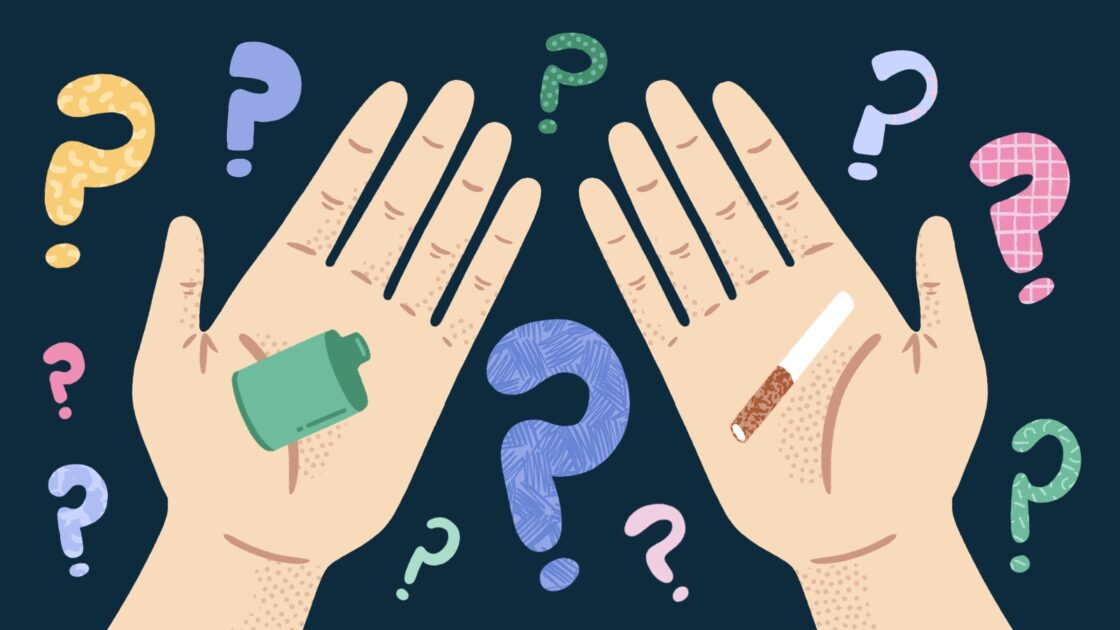Vaping vs smoking: comparing the health effects
If you vape, you may be curious about the differences between vaping and smoking and their associated risks

Since the introduction of vapes or e-cigarettes to the market, many people have started vaping. Most people who vape either smoke or have smoked in the past. However, in the under-25 age range some vape users were not smokers beforehand.
If you vape, you may be curious about the differences between vaping and smoking and their associated risks. This article provides information on the differences between vaping and smoking, the health impacts of vaping and how to quit, or reduce your usage, if you want to.
The HSE does not recommend using vaping products to quit smoking and has expressed concern about the health effects of vaping. It instead directs smokers or people who vape to use licensed products, such as Nicotine Replacement Therapy, to help them quit.
How does vaping work?
Most vapes contain four main elements:
- A battery
- A cartridge or pod that contains a flavoured juice/liquid and nicotine
- A heating element or coil
- A mouthpiece through which to inhale
In many vape devices, pushing a button or inhaling through the mouthpiece turns on the battery-powered heating element or coil.
The visible cloud that is produced by vaping is sometimes called ‘vapour’ because many believe it to be vaporised water, but this is not the case.
In scientific terms, the cloud produced by a vape is actually called ‘aerosol’. The aerosol is created when the e-liquid inside vaping devices is heated by the heating element in the vape. This aerosol contains nicotine, as well as flavouring chemicals, carrier oils and other substances.
Vaping vs smoking
Smoking involves burning tobacco and then inhaling the smoke.
Cigarette smoke contains:
- Nicotine
- Tar
- A number of chemicals that are extremely damaging to the human body (arsenic, formaldehyde, etc)
- Carcinogens (substances that can cause cancer)
Some of the health impacts of smoking include:
- Heart disease
- Stroke
- Lung disease
- Cancer
- Premature death (on average 10 years early)
Smoking is very dangerous. If you don’t smoke, not starting is the best way to protect your health. If you smoke, stopping is the best way to avoid the harm caused by smoking.
Compared to smoking, vaping does not expose users to most of the same chemicals as smoking. This is because no burning of tobacco is involved and no smoke is produced.
Vaping may be less harmful than smoking, but both have negative health effects. A lot of the potential long-term health effects are not currently known, as these products have not been around as long as cigarettes.
What is in a vape?
Vaping liquid contains:
- Nicotine
- Carrier oils
- Flavourings
- Heavy metals
- Chemicals that are harmful to the human body
Vaping can also cause users to inhale small particles of metals such as zinc and magnesium that break off of the heating coil that creates the vapour. Vaping has also caused burns, blast injuries and poisoning. Find out more about the health effects of vaping.
For this reason, vaping is not a “healthy” choice or a health product and is not recommended by the HSE as a tool to help quit smoking.
Vaping and nicotine
Both tobacco and e-cigarettes/vapes contain nicotine, a highly addictive substance. Until about age 25, the brain is still developing and using nicotine can harm the parts of the brain that control attention, learning, mood and impulse control.
When nicotine enters the body, it causes the body to release adrenaline. It also stimulates parts of the brain associated with a feeling of pleasure and reward. These effects can cause people to become addicted to nicotine.
Nicotine can raise your blood pressure and cause problems in the lungs, stomach, heart and more.
Physical side effects of nicotine include:
- Increased heart rate and blood pressure: because nicotine is a stimulant, it raises the amount of adrenaline, in the body, which raises heart rate and blood pressure.
- Damaged blood vessels: nicotine narrows arteries and damages blood vessel walls, increasing the risk of blood clots, heart attack, and stroke.
- Increased risk of cardiovascular disease: nicotine contributes to the development of atherosclerosis (plaque buildup in arteries) and can lead to heart disease and other heart problems
Vaping and its effect on the brain
Vaping products contain nicotine, which affects the brain. Using nicotine makes users feel good and impacts parts of the brain associated with pleasure and reward, which is why it can be so addictive.
The brain is especially vulnerable to nicotine during key periods of growth, such as when a fetus is in the womb or during adolescence. Up to the age of 25, the brain goes through a period of change and growth and is more easily affected by substances.
Research has connected nicotine use during this time with decreased attention span and impulse control. Find out more about how nicotine affects the brain.
Research also suggests that young people who vape are more likely to experience the symptoms of anxiety disorders or depression.
What are the health effects of vaping?
As vape and e-cigarette products have not been available for as long as tobacco, there is not as much research about the health effects of vaping as there is about the health effects of smoking. The fact that there is a lot not yet known has caused concern within the medical and scientific community.
There is evidence that vaping can affect the lungs in multiple ways. Various ingredients in vaping liquid or ‘juice’, such as flavourings and carrier oils, can cause inflammation in the lungs and irritate the mouth and throat. Inflammation in the lungs can lead to the development of lung disease and can negatively impact how the lungs fight infection.
There is evidence that people who vape are significantly more likely to have asthma, or that vaping can make asthma symptoms worse.
Vaping can also cause users to inhale small particles of metals such as zinc and magnesium that come off the heating coil that creates the vapour. Find out more about the health effects of vaping.
The 2019 vaping lung injury (EVALI) outbreak
In 2019, a number of people who used vapes and e-cigarettes suffered injuries around the US. In total, 2,807 experienced lung injuries, of which 68 later died. This event is sometimes called the 2019 EVALI outbreak.
Most of the people who experienced lung damage from these vapes needed to go to hospital. It is speculated that more people than those confirmed could have been affected, as most confirmed cases came from hospital admissions.
This outbreak was later deemed to be associated primarily with illegal products sold on the black market that also contained THC, the psychoactive compound in cannabis.
A substance called vitamin E acetate was also strongly associated with lung injuries associated with this outbreak and was present in both THC vapes and nicotine-only vapes. This substance was been subsequently banned from use in vapes in many countries.
Vaping and then later starting to smoke
Health experts are concerned about instances where people who did not previously smoke take up vaping.
There is evidence that those who start vaping from a young age, such as between the ages of 13 and 17, are more likely to become smokers.
Studies done on young people who start vaping also suggest that those who may have been less likely to become smokers than their peers are attracted to vapes. As a result, these people could end up becoming smokers when they otherwise may not have.
Smoking has numerous negative health effects on every part of the body and is proven to lead to cancer, heart disease, stroke, lung disease, premature ageing of the skin, and more. Smoking is the leading cause of preventable death in Ireland and almost 4,500 people die each year from tobacco-related diseases, according to the HSE, Ireland’s health service.
Using vaping to quit smoking
Some people start vaping when trying to quit smoking cigarettes or rolling tobacco or reducing how much they smoke. In only a few countries, such as the UK and New Zealand, vaping is officially recognised as less harmful than smoking. The UK’s health service currently encourages the use of vaping products to aid in quitting smoking. However, the World Health Organisation does not recommend vaping as a safe way to quit smoking.
The HSE does not recommend using vaping products to quit smoking and has expressed concern about the health effects of vaping. It instead directs smokers or people who vape to use licensed products, such as Nicotine Replacement Therapy, to help them quit.
Support for if you want to quit vaping
If you are finding it hard to quit or reduce how much you vape, on your own, you can speak to your GP or pharmacist.
Using Nicotine Replacement Therapy (NRT) such as patches, inhalers or gum, could be helpful. These treatments were developed to help smokers stop smoking but could be useful to people who want to stop vaping. GPs can also prescribe certain medicines to deal with nicotine withdrawal.
You can speak to your GP or pharmacist about NRT or use the HSE’s quit smoking resource, Quit.ie, to find out more information on quitting and on accessing NRT free of charge.
Feeling overwhelmed and want to talk to someone?
- Get anonymous support 24/7 with our text message support service
- Connect with a trained volunteer who will listen to you, and help you to move forward feeling better
- Free-text SPUNOUT to 50808 to begin
- Find out more about our text message support service
If you are a customer of the 48 or An Post network or cannot get through using the ‘50808’ short code please text HELLO to 086 1800 280 (standard message rates may apply). Some smaller networks do not support short codes like ‘50808’.






